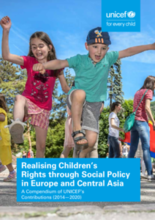Highlights
UNICEF’s Europe and Central Asia Region (ECAR) is diverse and dynamic, comprising 23 countries which range from low- to high-income, contain among the world’s largest and smallest populations, and are in various stages of the demographic transition. Children, adolescents, and youths in the region face unique challenges that have the potential to derail their opportunities, including exposure to man-made and natural disasters, risks of poverty and deprivation, discrimination and marginalisation, lack of opportunities to attain appropriate skills and employment, and inadequate access to core social services that impact child well-being. There is a strong tradition of social and public policies aimed at reducing poverty and deprivation in the region, and these have an important role to play in addressing the vulnerabilities associated with childhood and adolescence.
This Compendium documents UNICEF’s social policy interventions in Europe and Central Asia from 2014-2020 and includes 18 case studies from 15 different countries as well as stories from the field. The timeframe selected represents work undertaken during two of UNICEF’s global Strategic Plans (2014-2017 and 2018-2021), which have included four discreet areas of social policy focus. Where possible, documented evidence for impacts that have emerged more recently in 2019-early 2020 have also been included, though this Compendium notably excludes specific efforts to address COVID-19.
The Compendium details UNICEF’s contributions in the ECA region across the following four Action Areas:
1. Extending Social Protection adequacy and coverage by developing evidence and advocacy, policies and systems, shock-responsive social protection, cash plus/linkages, cash transfer programming, expanding coverage, cash plus social services, and social protection financing.
2. Improving Public Finance for Children by focussing on increasing transparency and accountability, improving equity, increasing value for money/impact of spending, promoting budget adequacy, and improving decentralised public spending.
3. Reducing Child Poverty through improved measurement, linking measurement to policy and programmes, reducing poverty.
4. Supporting Decentralisation and Local Governance to ensure other critical social policy areas are delivered and implemented at the local level with optimal impact.
Read Russian version here.

